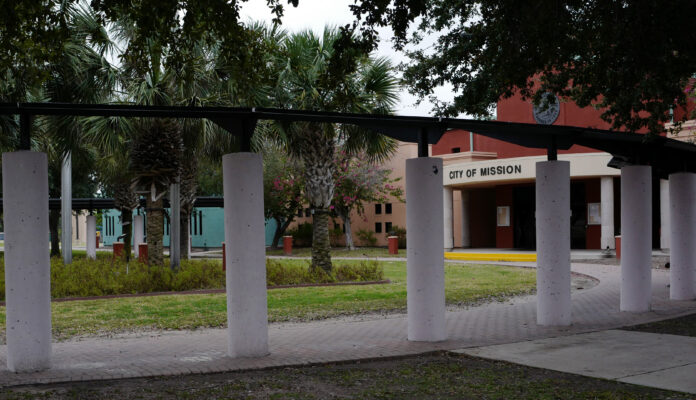
|
Only have a minute? Listen instead
Getting your Trinity Audio player ready...
|
Just a few weeks after questions arose over months’ worth of sales tax revenues that the city of Mission had failed to transfer into the coffers of its economic arm, top officials announced that the Mission Economic Development Corporation has since been made whole.
Mission City Manager Randy Perez delivered the news during a city council meeting on Monday.
“The funds to the MEDC were transferred on Friday for the amount of $2.7 (million) that was previously allocated,” Perez said.
At the same time, the city manager also sought the council’s approval to use some $1.9 million in federal COVID-19 relief funds to reimburse the city for what he characterized as “government services.”
Resolving the issue, however, sent ripples into the MEDC and toward the man who first brought the matter of the missing sales tax revenues to the public’s attention.
That’s because, just moments before the council voted to approve the $1.9 million ARPA reimbursement, they also voted to replace Noel Salinas, whose term on the MEDC board of directors was set to expire at the end of the year.
Last month, Salinas was the first to speak out about the nearly $3 million in sales tax revenues that the city had failed to transfer from its bank accounts to the MEDC’s.
Those funds represent months’ worth of the MEDC’s portion of the city’s sales tax revenues.
Of the 8.25% in sales taxes that consumers pay while shopping in Mission, 6.25 cents per dollar go to the state, while the remaining 2 pennies come back to the city.
Decades ago, Mission chose to allocate one-half penny of that to the MEDC.
Today, that half-penny contribution adds up to hundreds of thousands of dollars in revenue each month.
But, for an untold number of months, the city had not transferred the MEDC its share of those sales tax revenues.
Salinas alleged that the money had been used to fund the city’s daily operating expenses, including employee payroll.
On Monday night, the Mission City Council unanimously voted to replace Salinas on the MEDC board with Julian Alvarez.
Meanwhile, the city manager continues to insist the city never lost track of funds meant for the MEDC.
“The city asserts that all EDC funds were accounted for at all times,” the city stated in a news release sent to The Monitor on Wednesday.
“There was never any money missing from Mission EDC, and the delay did not impact Mission EDC operations. All of Mission EDC’s expenditures and financial obligations were met,” the release further states.
Instead, the city delayed transferring the MEDC sales tax revenue allocations because of “the timing of cash flow for various city projects,” the release stated.
In essence, Mission used the MEDC’s share of sales tax revenues to make front-end payments on several infrastructure projects, including a new fire and police substation, and three road projects at Military and Inspiration Roads, Taylor Road, and the 365 Loop project.
“The city is the fiduciary agent on several projects … that required an upfront contribution of funds with expected reimbursements. As a result, the EDC’s allocations were deferred,” the city stated.
Mission officials also objected to characterizations that federal COVID-19 relief dollars were used to repay the MEDC.
The city transferred nearly $2.8 million out of its coffers to the MEDC on Jan. 5, Perez explained to the council on Monday.
As a separate issue, the city manager was asking the council to consider reallocating $1,951,832 of American Rescue Plan Act, or ARPA, funds that they had previously earmarked for infrastructure projects.
Those federal dollars, the city manager explained, would be used not to pay the MEDC, but to repay the city itself for funds spent on “government services.”
“I just wanted to make that clarification that these are for reimbursements for government services and the funds to the EDC have been transferred as of Friday of last week,” Perez said.
The city manager said he had reached out to attorneys at Weslaco-based law firm, Jones, Galligan, Key and Lozano, whether that type of reimbursement is allowable under U.S. Treasury Department guidelines, which govern the use of COVID-19 relief funds.
“The city may properly designate the allowance towards the proposed items reflected in the budget amendment,” Perez said.
A 10-page Treasury Department guide on ARPA funds describes acceptable uses to include “general government operations, such as general government administration, personnel costs, administrative facilities, record keeping…” and more.
City records show that the $1.9 million was deobligated from an $8 million fund of ARPA money meant for “machinery and equipment.”
That’s according to a Dec. 13, 2023 budget amendment — a proposal dated a week prior to Perez’s cash flow analysis presentation to the city council on Dec. 18.
Four out of the council’s five members voted to approve Perez’s recommendation to reallocate the ARPA funds.
The lone “nay” vote came from Place 2 Councilman Ruben Plata, who, during that mid-December meeting, had vocally disagreed with pulling funds away from planned projects to replenish the city’s general fund.



